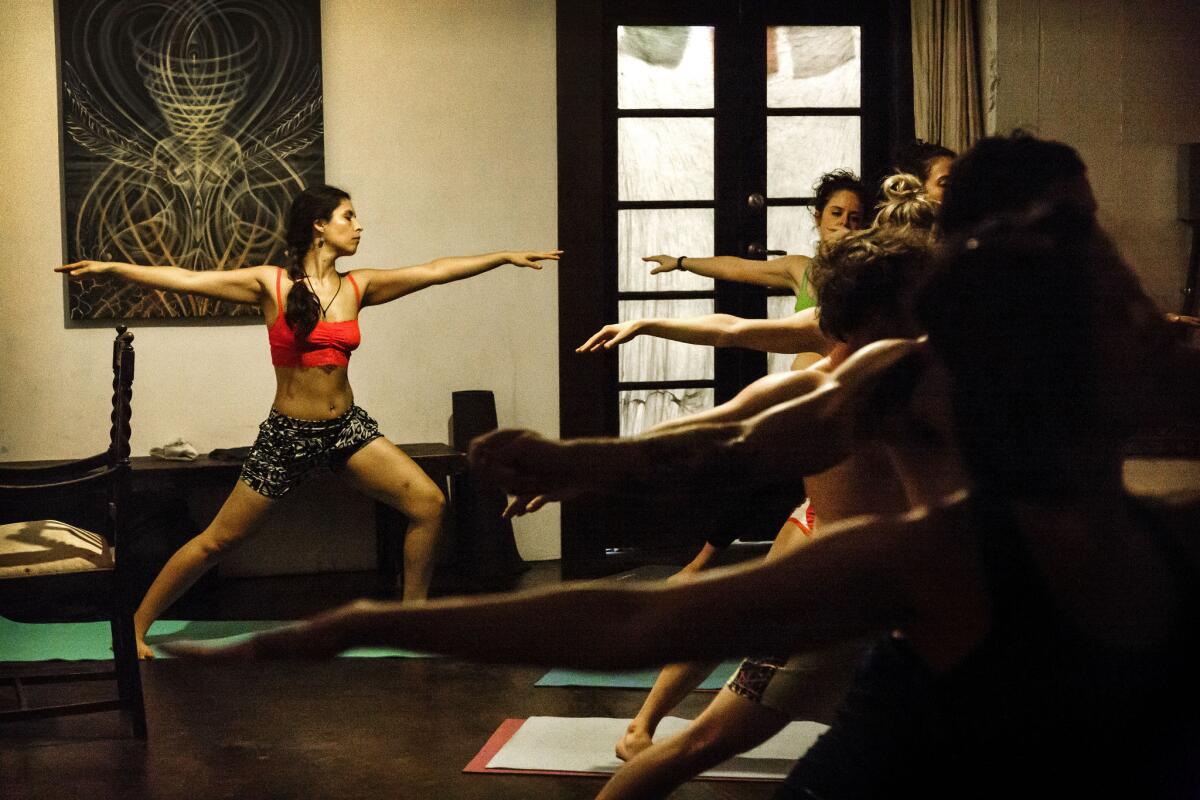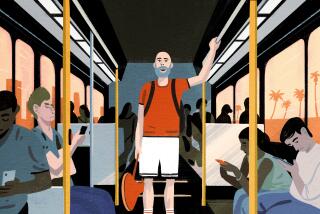Setting Times stories to music: From Phoenix to the Beatles

During these first weeks when the nights are dark not long after 5, one thing offers solace: the bus ride home through Chinatown.
That’s because the flip has been switched on the neon: The show-stopping curves of the Chinatown gate, its spindly tentacles like some kind of sea creature. The fat Buddha on the K.G. Louie Co. sign. The red neon tracing the roofline of the Royal Pagoda Motel, with its mid-century, vaguely Asian-style font for the “Drive-In” and “Office.” And in the industrial wasteland north of Chinatown, the mysterious “Concrete is Fluid.”
Chinatown is retro-beautiful any time of the day, but the neon casts a nice glow over a humdrum workaday commute.
I like to think of the song pairings below as a bit of neon for the Great Reads: Sure, they don’t need it, but what’s not to like about a little extra glow?
Anyway, in these roundups of the week gone by, I’d like to offer the first paragraphs of each Great Read (or, as they’re known in print, Column One) -- maybe they’ll buy your eye and you can settle in for a good weekend read. And you’ll also get the songs that inspired me while editing the stories, or reading them later if my fellow editor Millie Quan ushered them through. A story-song combo!
#
Murder or mercy for woman with disability?
Decorated by Gen. Dwight D. Eisenhower for bravery at the Battle of the Bulge, William Knox Roberts was a fighter. A surgery for liver cancer in 1999 had left him in the clear, but in February, he developed lung congestion that wouldn’t clear.
X-rays revealed chronic pulmonary disease — and a mass on his liver. In July, Kaiser placed him under hospice care.
He confided in his 59-year-old son, Tom, that breathing was like being waterboarded, and he grew more and more apprehensive about the fate of Tom’s sister, Marian, who had needed round-the-clock care since a brain injury in 1987.
“He told me: ‘You can’t do it by yourself. You can’t do it alone,’“ recalled Tom, who had slept on an air mattress at the foot of his sister’s bed for more than a quarter of a century.
The elder Roberts, now 88, had grown hard of hearing and become a bit paranoid. He slept with a gun under his pillow, Tom said, and would on some nights tromp midway down the stairs leading to the siblings’ room and sit there for hours, armed, to “protect his daughter” from intruders.
On Aug. 17, however, he seemed in high spirits. He suggested a big dinner of prime rib and potatoes. Marian “loved it,” Tom said. The following night, brother and sister turned in at 11 p.m.
At 4:30 a.m., Tom leapt up to the sound of back-to-back pops and stepped on something he initially thought to be a tooth. As he raised it to his face in the darkness, he saw a shell casing coated in ceiling plaster.
“I dropped it and dialed 911,” he said.
#storysongs combo: “Mercy Street,” by Peter Gabriel. Although it’s an homage to the poet Anne Sexton, I thought the line “Looking for mercy/in your daddy’s arms” worked, in a negative kind of way.
#
In Karachi, crime leaves few families untouched
When the gunmen slid in the back seat behind Saad Qaimkhani and his friend, the college student thought they were after his cellphone, or maybe the car. Then the men told them to drive.
Almost all private cars in this shoot-’em-up city have an embedded device that allows a security company to lock the engine of a stolen vehicle remotely. In this case, though, when a bystander alerted the security company and the car came to a standstill, the thugs ordered the young men into another car and drove them around Karachi to make sure they weren’t being tailed.
That’s when Qaimkhani knew for sure: He was being kidnapped.
He and his friend were taken to a two-room house near the Northern Bypass, a neighborhood filled with poorly built one- and two-story structures where police are as rare as snow.
Their phones and wallets were taken and their legs chained to a bed. They were interrogated about family wealth and contact numbers, then beaten so their relatives would hear their panic during ransom calls afterward. The three kidnappers demanded $300,000 for the pair.
For six weeks, Qaimkhani and his childhood friend were locked to the bed, sleeping chained together on the mattress, interrupted only by visits to a primitive toilet. The two chain-smokers squabbled over their one-pack daily allowance and ate cheap, bad-tasting food. Occasionally, they were allowed to watch Bollywood DVDs.
#storysongs combo: “Victim of the Crime,” by Phoenix. My early passion for the French band has waned, but this is still a good song.
#
A hostile work environment, but ‘these are not bad kids’
On the first day of school at Spurgeon Intermediate, after the first bell had rung and administrators swept the halls for stragglers, new Principal Todd Irving faced dozens of parents in a room near his office. A translator stood at his side.
Eliazar Arines, whose son is in the eighth grade, told Irving that last year her boy was ridiculed so mercilessly that he was hospitalized for depression.
“I came to complain five times, and no one paid attention to me,” she said, her voice cracking.
Edelmira Rodriguez told Irving her son’s ID was snatched and marked up with slurs. She too complained, and nothing was done.
One woman, who recently moved to Santa Ana from Tustin, said what many in the room were thinking:
“When someone says Spurgeon, it’s like the worst thing in the world.”
Spurgeon Intermediate in Santa Ana sits squarely in the center of one of the poorest ZIP Codes in Orange County. For years, it has consistently ranked one of the lowest-performing schools in the region. But early this year, things got even worse.
In March, 36 teachers and employees took the unusual step of filing a hostile work environment complaint against the administration and students. Children were accosting adults, smoking marijuana, making sexual noises in class, the complaint said. By the end of the school year, more than 40% of the students had been suspended for a total of more than 800 days.
Things were so bad, one teacher said, it was like “Lord of the Flies.”
#storysongs combo: “Suspended From Class,” by perennial favorite Camera Obscura. The rhyme in the chorus always makes me laugh. And love the trumpet.
#
Bernstein High football players earn letters — of parents’ love
Damian Sanchez was downcast. It was the day after his football team’s first loss of the season, and the senior defensive back from Hollywood Bernstein High was having a tough time shaking the disappointment.
After a team meeting, he returned to the one-bedroom apartment near Koreatown he shares with his mother and two younger brothers, took a shower, then opened the door to a closet to reach for a clean shirt.
That’s when he was once again drawn to the piece of paper taped to the wall next to his clothes. He paused to read the handwritten words.
“I want to tell you that from the moment you were in my belly, I loved you dearly. I love you then, today and always. You are my world, my everything. Without you, there’s no me.”
It was a letter from his mother, Myrna, and it had the desired effect.
“I see it every day in the morning before I go to school,” said Damian, 17. “It makes me think everything will be fine.”
Myrna Rivera was a teenager herself when she became a mother. Now she puts in long hours as an office worker to support her family, and there is little time to rest, let alone collect her thoughts and write a letter to her boy about how much she loves him.
A request from Damian’s high school football coach coaxed her into expressing her feelings and transformed the relationship she has with her son.
Bernstein Coach Masaki Matsumoto was raised by a single parent and knew firsthand the value of feeling loved. He came to the United States from Japan with his mother, Keiko, when he was 7. “It was just her and I,” he said.
Matsumoto, 31, estimated that 60% of the nearly 100 players on his varsity and junior varsity teams are guided by single mothers, the reason, he added, that “my heart is so big for these kids.”
#storysongs combo: “P.S. I Love You,” by the Beatles. I’m a Beatles lowbrow – love the early stuff.
#
Raising the feel-good energy at Peace Yoga
As soon as Cheri Rae Russell steps onto Spring Street, parking lot flag wavers and quinceañera outfitters flock to her like sparrows to St. Francis. Either this is a woman who has lived a life seriously committed to erasing all traces of urban anonymity, or she is simply that charismatic.
“Mi amor,” the flag wavers tell her, mid-hug. “Mi amor!”
Russell bounds through traffic on her two-block commute to work with about as much glee and purpose as someone can bound, pausing for a split second to pick up litter on the sidewalk.
She arrives at Peace Yoga Gallery, where an enormous Buddha carved from volcanic rock attracts offerings of coins from the homeless in the neighborhood.
Inside, the waiting crowd is a mix of Type A careerists, tattooed musicians and working-class Russians just finishing a day’s work in the fashion district. No money exchanges hands — there’s an honor box, or you can pay later on PayPal or just clean some yoga mats after class.
“I really hate touching money,” Russell says. “With the people who come here, I prefer to have an exchange of energy, not paper.”
The Type A’s have to let go here. Classes rarely begin on time, and even though most are scheduled to last two hours, they more often go for three. On some weekends, no one shows up to teach the classes at all. (One student’s response? He cartwheeled back to his car.)
“I’m trying to break through the constraints of time. I’m almost there,” Russell tells her students. “We are here to experience deep joy. Everything else is an illusion.”
In a downtown known more for deal-making than joy-making, a community has formed around Russell and her studio’s unconventional mores — maybe even an innocent cult.
“For downtown, Peace is like having the most amazing feng shui and not knowing where it comes from,” says Santino Rice, a fashion designer and reality television personality. “It is kind of an anchor for all the amazing energy that is going on on Spring Street.”
#storysongs combo: “Try a Little Tenderness,” by Otis Redding. This was more of a situational choice. I happened to be listening to Otis while editing the story, and thought this song fit the mood of the story. And of course, the song reminds me of the classic scene from “Pretty in Pink,” a tour de force by Jon Cryer.
#
If you have ideas for story-song pairings of your own, tweet the title and artist to @karihow or @LATgreatreads with the hashtag #storysongs.
More to Read
Start your day right
Sign up for Essential California for news, features and recommendations from the L.A. Times and beyond in your inbox six days a week.
You may occasionally receive promotional content from the Los Angeles Times.






